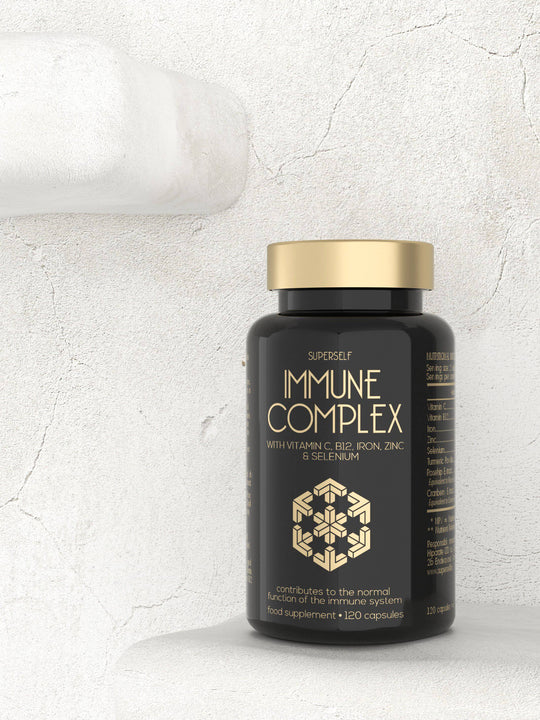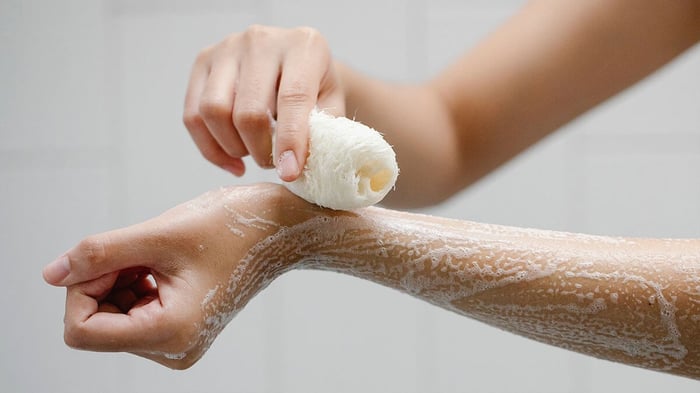Mild viral infections, such as the common cold, are incredibly common: adults tend to get 2-3 colds per year, while children can get as many as one a month in the winter. Other viruses, such as chickenpox, Covid, or influenza (flu) can be more serious. Fortunately, your body has natural defences against viruses, and you can help support your immune system in a number of simple ways. Below you’ll find 10 ideas to try this cold season.
1. Wash your hands
One of the easiest ways to avoid getting ill is to stop the germs getting in. By washing your hands regularly, you’ll avoid spreading germs to areas that are easy for a virus to colonise, such as your nose and mouth, or things you eat and drink with, such as a cup or cutlery. Most viruses need to get inside your body somehow, which is why stopping them at your hands can be enough. Avoiding touching your face or chewing your nails can also help and for airborne viruses, a mask worn over your nose and mouth can also reduce the risk.
2. Stay away from sick people
It seems obvious, but if you don’t want to get ill, staying away from people who are symptomatic is a good first step. Encouraging sick leave or home working, and staying home yourself when you’re ill can be particularly useful if you’re a boss or manager, as it sets an example for your team. Choosing to walk or cycle to work or meeting up with friends outside can be a win-win as it gets you some exercise and keeps you out of crowded, germ-ridden spaces.
3. Keep moving

A recent study in the British Journal of Sports Medicine suggested that those who exercised at least 5 days a week had roughly half the chance of coming down with a cold as those with a more sedentary lifestyle. The more active people reported less severe symptoms, too. Of course, if your ability to move is restricted by injury, illness or another condition, that condition might affect your immune system too. However, every little bit helps, so if you can do some exercise, such as a daily walk or a bit of gardening, that is much better than a fully sedentary lifestyle.
4. Take care of your gut
"Eighty percent of your immune system is in the gut, so when it's healthy, we tend to be able to fight off infections faster and better,” says Yufang Lin, M.D., of the Center for Integrative Medicine at the Cleveland Clinic. Probiotic foods, which contain natural doses of good gut bacteria, can help maintain a healthy gut. These include fermented foods, such as yogurt, sauerkraut, miso and kefir. You can also take a probiotics supplement with live bacteria. Prebiotic foods or supplements contain fibre and other nutrients which nourish these good bacteria.
5. Get your vitamins
A number of essential vitamins and minerals contribute to the normal functioning of the immune system, including vitamins A, B6, B9, B12, C and D; selenium, iron, zinc and copper. Being deficient in any of these can increase your risk of illness. A varied diet including a range of fresh, unprocessed foods is a good way to make sure you get a wide range of nutrients, but if you’re looking for a convenient daily option, a high-quality multivitamin can help.
Immune Complex with Vitamin C, B12, Iron, Zinc & Selenium - 120 Capsules

£16.42
£21.90
Packed with vitamins, minerals, herbal extracts and probiotics, this complex is designed to support immune system health. Contains vitamins C, B12 Zinc, iron and selenium Take 2 capsules daily The boost you need right now About immune complex All-natural ingredients… Read More
6. Get some sunshine
Vitamin D, which contributes to the normal function of the immune system, is formed in your skin when it’s exposed to daylight. In winter, when colds, flu and other viruses tend to be most active, it can be hard to get enough of this essential nutrient. In the UK, the NHS recommends that everyone takes a vitamin D supplement in the winter, but soaking up some winter sun is also a good boost – just don’t get burned!
7. Try a contrast shower

A relatively new idea, ‘therapeutic contrasting’ involves quickly changing the temperature of your environment from hot to cold and back again. The theory is that cycling through these temperature changes, you can trigger effects such as increased blood flow and increased circulating white blood cells, which may benefit your immune system or help you fight off an incipient infection. To try it at home, take a shower and turn the temperature up until it feels hot (not painful or scalding) for 3-4 minutes. Switch to cold for 1 minute, then back to hot. Repeat the hot-cold cycle a few times when you shower. As an added bonus, it tends to be invigorating and a good way to wake up.
8. Avoid unnecessary antibiotics
Antibiotics are amazing, miracle drugs, but they don’t work against viruses, such as colds, flu (influenza) or Covid (a coronavirus). Antibiotics fight bacterial infections, and for this reason, they can also upset the balance of healthy bacteria in the digestive tract. Taking antibiotics unnecessarily can do more harm than good, so if your doctor says you have a virus, don’t ask for an antibiotic. For serious illnesses, antiviral medications may be available.
9. Keep your vaccinations up to date
While antibiotics won’t help, following the recommended vaccination schedule for your age and risk profile will. Vaccinations are like a training simulator for your immune system, giving your body a chance to learn how to defend itself before it encounters the real thing. As viruses mutate quickly, it’s important to give your body regular refreshers, which is why there’s a new flu vaccine each year and there have been several Covid vaccinations and boosters.
10. Try to relax

Continuous stress can negatively affect the immune system, so constantly worrying about getting ill could, ironically, make you more likely to catch something. Finding ways to relax, bring a moment of calm into your day or reduce the impact of stressful situations can have multiple benefits. As well as possibly supporting your immune system, reading a fun book, watching a funny TV show or listening to cheerful music is intrinsically pleasant, and can make your day brighter. If you think you are coming down with something, a bit of self-care can help nip it in the bud and make you feel less ill, so perhaps consider that comedy podcast or episode of Friends medicinal.
Find more SuperSelf reviews here.


